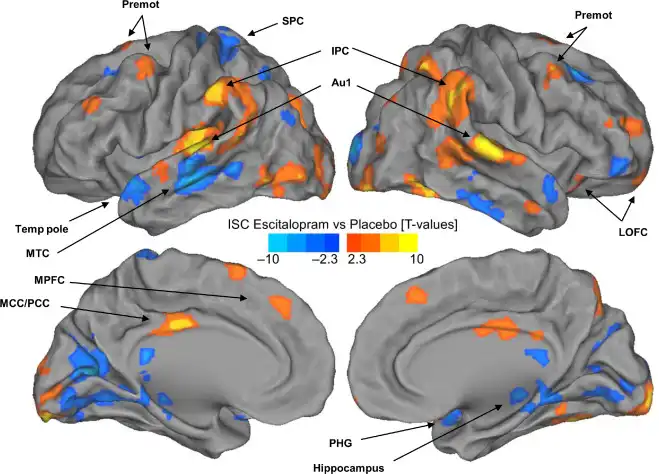Selective serotonin reuptake inhibitors (SSRIs) like escitalopram are widely prescribed for the treatment of depression and anxiety disorders. While these medications can be effective in managing mental health conditions, there are potential side effects that patients should be aware of. One of the concerns associated with escitalopram is the possibility of weight gain. This article will explore the relationship between escitalopram use and weight gain, the prevalence of this side effect, and strategies for managing it.
How Does Escitalopram Affect Weight and Metabolism?
Escitalopram, as an SSRI, works by increasing the levels of serotonin in the brain, which can have various effects on mood and behavior. However, the impact of escitalopram on weight and metabolism is not fully understood. Some studies suggest that changes in appetite, alterations in serotonin levels, and metabolic side effects may contribute to weight gain in some individuals taking escitalopram.
The mechanisms by which escitalopram might influence weight are complex and multifaceted. Serotonin plays a crucial role in regulating appetite and satiety, and changes in serotonin levels can affect eating behavior [1]. Some patients report increased appetite or cravings for carbohydrate-rich foods while taking escitalopram, which could lead to increased caloric intake and subsequent weight gain [2].
Additionally, escitalopram may have subtle effects on metabolism. Some research suggests that SSRIs can influence the body's energy expenditure and fat storage processes. For instance, a study by Beyazyüz et al. (2013) found that escitalopram treatment was associated with changes in leptin and ghrelin levels, hormones that play key roles in appetite regulation and metabolism [3].
Furthermore, escitalopram may indirectly affect weight through its impact on physical activity levels. Some patients experience fatigue or reduced energy as a side effect of the medication, which could lead to decreased physical activity and, consequently, weight gain [4].
Is Weight Gain a Common Side Effect of Escitalopram Use?
Weight gain has been reported as a potential side effect of escitalopram, but its prevalence can vary among individuals. Some patients may experience significant weight gain, while others may not notice any change in their weight. Factors such as genetics, diet, physical activity, and the dosage of escitalopram can influence the likelihood of experiencing weight gain as a side effect.
Clinical studies have provided varying estimates of the prevalence of weight gain associated with escitalopram use. A comprehensive review by Serretti and Mandelli (2010) found that the average weight gain associated with escitalopram treatment was approximately 0.5 kg (1.1 lbs) over a period of 6-12 months [5]. However, this average doesn't capture the wide range of individual experiences, as some patients report more substantial weight changes.
It's important to note that weight changes can occur for various reasons during the treatment of depression and anxiety. Improvements in mood may lead to increased appetite and weight gain in some individuals who had previously experienced weight loss due to their mental health condition. Conversely, reduced anxiety and improved energy levels might lead to increased physical activity and potential weight loss in others [6].
The timing of weight gain can also vary. Some patients may notice changes in weight within the first few weeks of starting escitalopram, while others may experience gradual weight gain over several months or even years of treatment. Long-term studies on the effects of escitalopram on weight are limited, making it challenging to predict the long-term impact of the medication on an individual's weight [7].

Strategies for Managing Escitalopram-Related Weight Gain
For those who experience weight gain while taking escitalopram, there are several strategies that may help manage this side effect. These can include dietary modifications, regular physical activity, and discussing alternative treatment options with a healthcare provider. It's important for patients to communicate any concerns about weight gain with their doctor to ensure the best possible care and treatment plan.
1. Dietary Modifications:
- Maintain a balanced diet rich in fruits, vegetables, whole grains, and lean proteins.
- Monitor portion sizes and practice mindful eating.
- Limit intake of high-calorie, processed foods and sugary beverages.
- Consider working with a registered dietitian to develop a personalized nutrition plan.
2. Regular Physical Activity:
- Aim for at least 150 minutes of moderate-intensity aerobic activity or 75 minutes of vigorous-intensity aerobic activity per week, as recommended by the World Health Organization [8].
- Incorporate strength training exercises to help maintain muscle mass and boost metabolism.
- Find enjoyable forms of exercise to increase adherence to a regular physical activity routine.
3. Stress Management:
- Practice stress-reduction techniques such as meditation, yoga, or deep breathing exercises.
- Engage in hobbies and activities that promote relaxation and well-being.
- Consider cognitive-behavioral therapy (CBT) to develop coping strategies for stress and anxiety.
4. Sleep Hygiene:
- Maintain a consistent sleep schedule.
- Create a relaxing bedtime routine.
- Avoid screens and stimulating activities close to bedtime.
5. Medication Adjustments:
- Discuss the possibility of adjusting the escitalopram dosage with your healthcare provider.
- Explore alternative SSRIs or other classes of antidepressants that may have a lower risk of weight gain.
- Consider augmentation strategies, such as adding medications that may help counteract weight gain.
6. Regular Monitoring:
- Keep track of your weight and body measurements.
- Monitor your food intake and physical activity levels.
- Regularly communicate with your healthcare provider about any changes or concerns.
It's crucial to emphasize that patients should not discontinue or adjust their escitalopram dosage without consulting their healthcare provider. Abrupt discontinuation of SSRIs can lead to withdrawal symptoms and potential relapse of depression or anxiety [9].
The Role of Healthcare Providers
Healthcare providers play a vital role in managing the potential side effects of escitalopram, including weight gain. They should engage in open communication with patients about the risks and benefits of the medication, monitor weight changes during treatment, and be prepared to adjust treatment plans as needed.
Providers may consider the following approaches:
1. Baseline Assessment: Conduct a thorough assessment of the patient's weight, body mass index (BMI), and metabolic parameters before initiating escitalopram treatment.
2. Regular Monitoring: Schedule regular follow-up appointments to monitor weight changes and discuss any concerns.
3. Patient Education: Provide comprehensive information about potential side effects, including weight gain, and strategies to manage them.
4. Individualized Treatment Plans: Tailor treatment plans to each patient's needs, considering factors such as pre-existing weight concerns, comorbid medical conditions, and personal preferences.
5. Collaborative Decision-Making: Involve patients in treatment decisions, discussing alternative options if weight gain becomes a significant concern.
6. Referrals: When appropriate, refer patients to specialists such as dietitians, exercise physiologists, or endocrinologists for additional support in managing weight.
Conclusion
Escitalopram, like other SSRIs, has the potential to cause weight gain in some individuals. Understanding the mechanisms behind this side effect and knowing the strategies to manage it can help patients make informed decisions about their treatment. While weight gain can be a challenging side effect, it's important to weigh the benefits of improved mental health against the potential for weight changes.
For many patients, the positive effects of escitalopram on mood and anxiety may outweigh concerns about modest weight gain. However, for those who experience significant weight gain or find it distressing, there are various strategies and alternative treatment options available.
Ultimately, the key to successful management of escitalopram-related weight gain lies in open communication between patients and healthcare providers, regular monitoring, and a holistic approach to treatment that considers both mental and physical health. By addressing concerns proactively and implementing appropriate management strategies, many patients can successfully balance the benefits of escitalopram with maintaining a healthy weight.
Always consult with a healthcare professional when considering the use of escitalopram or any other medication. They can provide personalized advice based on your individual health status, medical history, and specific needs.
If you are also interested in this product and want to know more product details, or want to know about other related products, please feel free to contact sasha_slsbio@aliyun.com.
References:
1. Halford JC, Harrold JA, Lawton CL, Blundell JE. Serotonin (5-HT) drugs: effects on appetite expression and use for the treatment of obesity. Curr Drug Targets. 2005;6(2):201-213.
2. Fava M. Weight gain and antidepressants. J Clin Psychiatry. 2000;61 Suppl 11:37-41.
3. Beyazyüz M, Albayrak Y, Eğilmez OB, Albayrak N, Beyazyüz E. Relationship between SSRIs and Metabolic Syndrome Abnormalities in Patients with Generalized Anxiety Disorder: A Prospective Study. Psychiatry Investig. 2013;10(2):148-154.
4. Cascade E, Kalali AH, Kennedy SH. Real-World Data on SSRI Antidepressant Side Effects. Psychiatry (Edgmont). 2009;6(2):16-18.
5. Serretti A, Mandelli L. Antidepressants and body weight: a comprehensive review and meta-analysis. J Clin Psychiatry. 2010;71(10):1259-1272.
6. Schwartz TL, Nihalani N, Jindal S, Virk S, Jones N. Weight gain in major depressive disorder: linking appetite and disordered eating to the components of pharmacological treatment. Adv Ther. 2004;21(4):199-215.
7. Hirschfeld RM. Long-term side effects of SSRIs: sexual dysfunction and weight gain. J Clin Psychiatry. 2003;64 Suppl 18:20-24.
8. World Health Organization. Global recommendations on physical activity for health. Geneva: World Health Organization; 2010.
9. Gabriel M, Sharma V. Antidepressant discontinuation syndrome. CMAJ. 2017;189(21):E747-E748.
10. Arterburn D, Sofer T, Boudreau DM, et al. Long-Term Weight Change after Initiating Second-Generation Antidepressants. J Clin Med. 2016;5(4):48.








